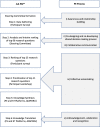People with lived experience (PWLE) of depression: describing and reflecting on an explicit patient engagement process within depression research priority setting in Alberta, Canada
- PMID: 30349739
- PMCID: PMC6190547
- DOI: 10.1186/s40900-018-0115-1
People with lived experience (PWLE) of depression: describing and reflecting on an explicit patient engagement process within depression research priority setting in Alberta, Canada
Abstract
Plain english summary: The Alberta Depression Research Priority Setting Project aimed to meaningfully involve patients, families and clinicians in determining a research agenda aligned to the needs of Albertans who have experienced depression. The project was modeled after a process developed in the UK by the James Lind Alliance and adapted to fit the Alberta, Canada context. This study describes the processes used to ensure the voices of people with lived experience of depression were integrated throughout the project stages. The year long project culminated with a facilitated session to identify the top essential areas of depression research focus. People with lived experience were engaged as part of the project's Steering Committee, as survey participants and as workshop participants. It is hoped this process will guide future priority setting opportunities and advance depression research in Alberta.
Abstract: Background The Depression Research Priority Setting (DRPS) project has the clear aim of describing the patient engagement process used to identify depression research priorities and to reflect on the successes of this engagement approach, positive impacts and opportunities for improvement. To help support patient-oriented depression research priority setting in Alberta, the Patient Engagement (PE) Platform of the Alberta Strategy for Patient Oriented Research Support for People and Patient-Oriented Research and Trials (SUPPORT) Unit designed, along with the support of their partners in addictions and mental health, an explit process to engage patients in the design and execution of the DRPS. Methods The UK's James Lind Alliance (JLA) Priority Setting Partnership (PSP) method was adapted into a six step process to ensure voices of "people with lived experience" (PWLE) with depression were included throughout the project stages. This study uses an explicit and parallel patient engagement process throughout each estage of the PSP designed by the PE Platform. Patient engagement was divided into a five step process: i) Awareness and relationship building; ii) Co-designing and co-developing a shared decision making process; iii) Collaborative communication; iv) Collective sensemaking; and v) Acknowledgement, celebration and recognition. A formative evaluation of the six PE processes was undertaken to explore the success of the parallel patient engagement process. Results This project was successful in engaging people with lived depression experience as partners in research priority setting, incorporating their voices into the discussions and decisions that led to the top 25 depression research questions. Conclusions The DRPS project has positively contributed to depression research in Canada by identifying the priorities of Albertans who have experienced depression for depression research. Dissemination activities to promote further knowledge exchange of prioritized research questions, with emphasis on the importance of process in engaging the voices of PWLE of depression are planned.
Keywords: Depression; Depression research; Patient engagement; People with lived experience (PWLE); Priority setting partnership; Process.
Conflict of interest statement
The DRPS project was reviewed and received ethical approval by two Research Ethics Boards at the University of Alberta and Athabasca University. Consent to participate was obtained by all PWLE providing input on the depression research priority questions. No individual data is presented in this manuscript.Not applicableThe authors declare that they have no competing interests.Springer Nature remains neutral with regard to jurisdictional claims in published maps and institutional affiliations.
Figures
References
LinkOut - more resources
Full Text Sources
Molecular Biology Databases
Miscellaneous


